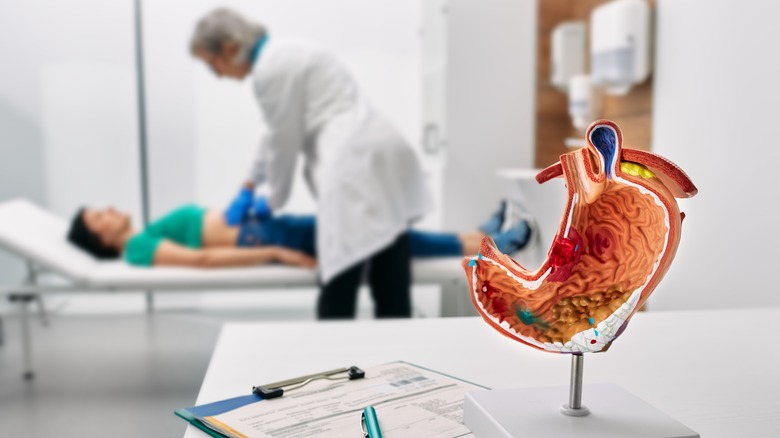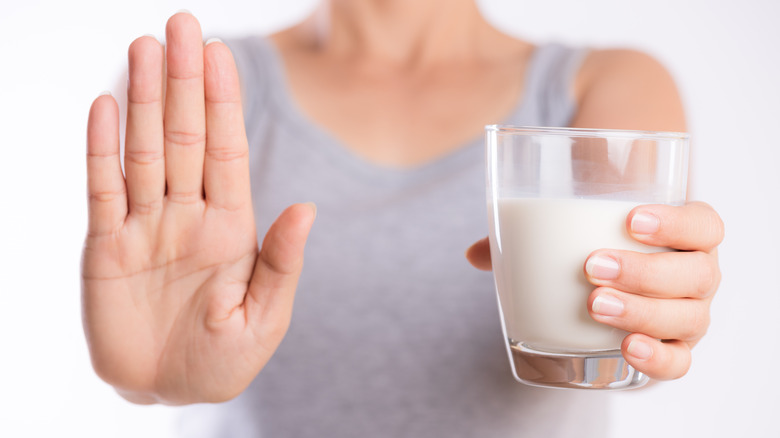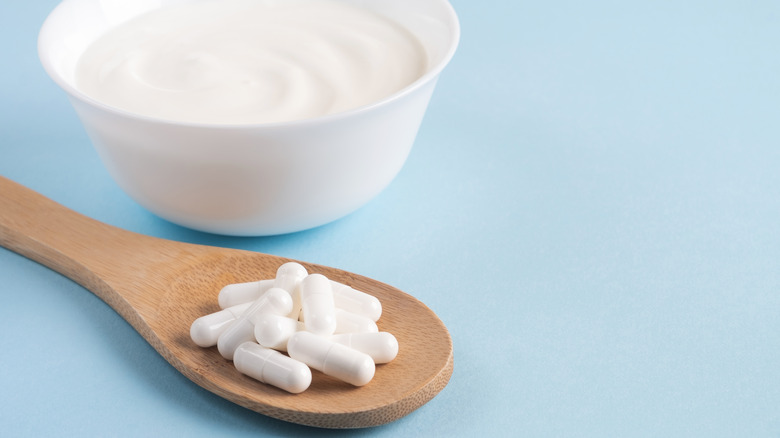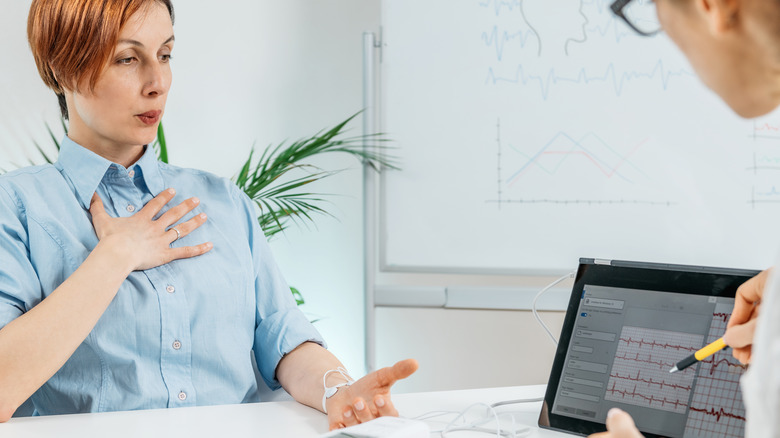What Is IBS And How Do You Treat It?
Irritable bowel syndrome (IBS) — we've all heard of it, but few want to talk about it. Overall, the condition is not considered a sexy topic, unless you are Hunter Haag from "The Bachelor," who repeatedly broadcast her struggles with IBS on national TV. Even if you aren't as brazen as the reality-show contestant and don't want to shout your stomach woes from the rooftops, you should know that the condition is quite common, with Johns Hopkins noting that approximately 15% of the American population deals with the unique joy that is IBS. And women are up to three times more likely than men to experience the chronic and often debilitating condition (per Clinical Epidemiology).
So chances are that you or somebody you know is affected. However, despite its prevalence, the condition is largely still a mystery to the medical community, with its etiology remaining elusive. Furthermore, the symptoms and presentation can vary widely from person to person, and it is notoriously difficult to treat. All these variables leave patients, and sometimes doctors, scratching their heads about what to do. Lucky for you, we are here to help better elucidate what the gastrointestinal disorder is and how best to treat it.
The definition of IBS
The Cleveland Clinic describes IBS as a gastrointestinal disorder characterized by "a group of symptoms that affect your digestive system." These symptoms can include stomachache, nausea, cramps, gas, bloating, and abnormal bowel movements. As for what possibly causes the disorder, Rok Son Choung and Nicholas J. Talley write in Gastroenterology & Hepatology that IBS is a "condition resulting from a number of different mechanisms such as disordered motility, visceral hypersensitivity, abnormal central processing, psychological factors, genetic factors, gut inflammation, and dietary factors."
There are four types of IBS: IBS-C, which is characterized primarily as IBS with constipation, IBS-D for IBS with diarrhea, IBS-M that presents with a mix of constipation and diarrhea, and IBS-U, when a patient doesn't fit into any of the categories. Many doctors will use the Rome criteria for helping to determine whether or not a patient has IBS and which subtype (per Medical News Today). If you feel you are frequently affected by any of these IBS symptoms, the first step would be to visit your primary care doctor or a specialized gastroenterologist to confirm any diagnosis and get a medical treatment plan. Outside of what the doctor prescribes, there are several things you can do on your own to supplement healing, which we will outline below.
Change your diet
Lifestyle changes, such as modifying your diet, are considered the first line of defense for treating IBS. This treatment method hinges on the philosophy of using food as medicine and eating a diet that consists primarily of fresh, non-processed, nutrient-dense foods. A healthy diet is a cornerstone of good health because it eases inflammation throughout the body and helps keep the digestion process flowing effortlessly.
In terms of which foods you should specifically be eating, there are many types of diets out there that claim to help ease IBS symptoms. These include the low-FODMAP, high-fiber, elimination, gluten-free, and low-fat diets (per Healthline). To determine what is the best diet for you, it is advised to visit a dietitian or nutritionist who specializes in gastrointestinal disorders to make sure you are treating your condition while also getting all the key nutrients your body needs.
Try the low-FODMAP diet to prevent IBS
The most successful and studied diet thus far is the Australian-born low-FODMAP diet. FODMAP stands for fermentable oligosaccharides, disaccharides, monosaccharides, and polyols. This diet has been shown to reduce symptoms in 86% of people and is helpful for treating both IBS and its sister disorder, small intestine bacterial overgrowth (per Johns Hopkins). This diet, while very restrictive in the initial phase, aims to reduce sugars and carbohydrates that are not easily absorbed by the small intestine. Those sugars can feed the bacteria in the gut and cause other intestinal issues (per Cleveland Clinic). If you can starve off the harmful excess bacteria and heal your intestinal lining, your overall digestive health will improve.
This diet has three phases. The first is eliminating the FODMAPs. Then you slowly reintroduce foods to find any culprits. Finally, you identify triggers and avoid them while returning to your normal diet.
Dr. Hazel Veloso tells Johns Hopkins, "We recommend following the elimination portion of the diet for only two to six weeks." After this, you can try a high-FODMAP food individually and see how you react. If you have a poor reaction, you'll know not to eat that food to avoid IBS symptoms.
Get tested for allergies and intolerances
What if you could ease your symptoms by simply eliminating trigger foods? For a few lucky individuals, removing foods that you have an allergy or intolerance to could be your ticket to better digestion. In most cases, people have an intolerance rather than a true allergy. Common intolerances are to lactose, fructose, fiber, and gluten (per The IBS Network). To determine if you have an allergy, your medical provider can perform diagnostic blood tests. Or, to help identify intolerances from home, you can keep a detailed food diary to track your diet and symptoms.
Additionally, performing an elimination diet is helpful to zero in on the foods giving you trouble (per Medical News Today). Once you know what sets you off, you can then eliminate or reduce your triggers to keep your digestion running smoothly. Remember, if you need help coming up with or sticking to a specific diet, it is always recommended to do so under the guidance of a registered dietitian or nutritionist to ensure safety and optimum efficacy.
Practice yoga and meditation
Both yoga and meditation help fortify a mind-body connection and aid in relaxing the mind. At the core of these practices is a concept called mindfulness, which is an important technique that allows one to be in a state of acceptance and open-mindedness, despite one's surroundings or circumstances. Put another way, the goal is to be fully present in each moment without judgment. For IBS patients, this is especially helpful because it is an avenue to develop an inner tool kit that allows one to self-soothe and invoke the relaxation response when needed. Cultivating this relaxation response has been shown to have a direct impact on improving IBS symptoms (via The Harvard Gazette).
Technically, meditation works by decreasing stress levels, anxiety, and inflammation, and it has even been shown to regulate genes that can contribute to IBS (per Dr. Ruscio). Similarly, yoga can bring down stress levels, promote a heightened awareness of the mind and body connection, and improve gut motility (per Yoga International). Both in-person and virtual yoga/meditation classes have been shown to be effective in decreasing the severity of IBS symptoms and increasing quality of life (per The American Journal of Gastroenterology).
According to Yoga International, five yoga poses that are especially helpful for healing and maintaining a healthy gut are parighasana (gate pose), ardha matsyendrasana (half-seated spinal twist), reclining abdominal twist, salamba setu bandhasana (supported bridge pose), and ananda balasana (happy baby pose). Now, who's ready to get their Zen on?
Hypnotherapy is an option for IBS
The gut-brain connection is no joke. Researchers have established that your mind and gut are in constant communication with each other through a bidirectional pathway, and the two need to be in sync for optimal health. One way to harness this connection for treatment purposes is to use hypnotherapy. The technique of hypnotherapy involves being guided into a relaxed mental state and then receiving suggestions while your brain is at an optimally receptive level. The treatment's function is to rewire the gut-brain connection and over time reduce the hypersensitivity of nerves in the digestive system (per Everyday Health).
"Patients who have completed treatment often find that the intervention has helped them learn how to relax not only their gut, but their mind. This is helpful for managing stress, which significantly impacts IBS. Patients are also thrilled to report that as their stress and IBS gets better, so do other areas of health — such as their mood, sleep, or muscle tension," expert Megan Riehl tells Everyday Health.
Get your ZZZs
Sleep is one of the top immunity boosters you can do for your body. Sleep is where your body repairs itself, and getting proper sleep will help your gastrointestinal tissues be as healthy as possible. While we sleep, our GI tract gets fully cleaned and repaired on a cellular level. It is important to recognize that sleep is linked to the vitality of all our biological systems, including our stomachs. Physician Ryan Barish emphasizes the connection between rest and GI health, telling Henry Ford Health, "There's still a lot we don't know — we're just scratching the surface, especially when it comes to how sleep influences our gut bacteria — but we do know that digestive health can play a role in how well someone sleeps, and sleep can affect how well the digestive system functions."
Unfortunately, 40% of people with IBS report sleep issues due to their symptoms (per International Foundation for Gastrointestinal Disorders). If you are experiencing sleep troubles, be sure to consult your health care provider to help determine the root cause and get help.
The probiotics debate and IBS
The use of probiotics for IBS has been a hot-button debate. However, the next generation of probiotics, or synbiotics, can help balance your microflora by utilizing a mix of prebiotics and probiotics to feed your good bacteria, while also working to displace bad bacteria. The result is a more balanced and healthy gut microbiome.
Additional benefits of synbiotics include an improvement in overall digestive health, boosted immune function, lower cholesterol levels, and reduction of inflammation (per WebMD). These new methods are still in their infancy, and while they are currently a promising alternative therapy, they still need additional research to become more mainstream (per Biomolecules). If you are interested in trying out the bacteria-targeted approach, popular synbiotics on the market today are Ritual, Seed, and Hum Skin Squad Pre + Probiotic. Remember to always clear any supplements with your healthcare provider prior to starting a new regimen.
Other supplements
In addition to eating a well-balanced diet, supplements are useful in filling in the nutritional gaps and providing targeted relief. Supplements such as peppermint oil, ginger, turmeric, fiber, L-glutamine, and more have been shown to help with optimal digestion function and can help alleviate common IBS symptoms. For instance, according to the National Health Service, peppermint oil is an antispasmodic, which helps the muscles of the digestive system relax.
Another recommended step is to increase your fiber intake by 20 to 35 grams daily (per International Journal of Molecular Medicine). You can try incorporating more fibrous foods into your diet or take a fiber supplement such as psyllium or Metamucil. Next, a supplement that could improve gut health is L-glutamine, an amino acid, which can help heal the intestinal lining and reduce gut inflammation (per Shape). Finally, a common herbal medicine among IBS patients is the same sweet and spicy plant that many eat with sushi: ginger. This supplement is a superstar at treating nausea and relieving stomach pains (per Complementary Therapies in Medicine).
Psychotherapy and antidepressants
It may not be the most obvious choice, but going to visit your psychologist or psychiatrist can benefit your belly. One of the mainstays of psychotherapy is cognitive behavior therapy (CBT), a method that has been shown to help patients think more positively about chronic pain and ease discomfort. This is a viable treatment option because the CBT model helps patients reevaluate and challenge unhelpful thoughts. Over time, this therapy can change detrimental thought patterns and help improve our emotional and physical states (per Clinical and Translational Gastroenterology). The CBT model is underpinned by the concept that our thoughts are largely responsible for our emotional well-being, and emotional stability is a driver for overall wellness.
Certain antidepressants have also been shown to help patients with IBS by working to restore brain-gut function and alleviate anxiety and depression, which many times goes hand-in-hand with chronic conditions such as IBS. Tricyclic antidepressants (TCAs) are useful for those with IBS-D, while selective serotonin reuptake inhibitors (SSRIs) are especially helpful for IBS-C. Treatment with antidepressants is typically recommended for more moderate or severe cases of IBS (per UNC Center for Functional GI & Motility Disorders).
Biofeedback
Biofeedback is all about training your body to help better control responses and reactions in real time. Patients can work with a professional who uses biofeedback sensors on the body to monitor different bodily functions. As a result, patients can work on changing their less-than-desirable responses to improve overall health outcomes. The types of physiological symptoms that can be measured include temperature, heart rate, respiration rate, muscle activity, and more.
For cases of IBS, biofeedback sessions are aimed at helping patients master more control over their sympathovagal balance, or "the autonomic state resulting from the sympathetic and parasympathetic influences" (per American Journal of Physiology). It has been shown that for many IBS patients their sympathovagal balance is out of whack (per Journal of Digestive Diseases). Overall, biofeedback treatment is considered a low-risk treatment method that can yield positive results, although more research is needed (per Cochrane Library). One is sure to gain lots of personal insight both inside and out from undergoing biofeedback-based interventions. Talk about getting to know yourself!
The timing of your meals can impact IBS
To beat IBS when eating, try eating smaller and more frequent meals, which will be easier for your digestive system to process. Also, feel free to take it easy when dining. Make every meal a time when you can slow down, thoroughly chew, and enjoy your food. This is not only a more enjoyable experience but one that favors your digestion as well. Furthermore, try not to skip meals. Dietitian Natalie Brown tells Best Health, "When we go through long gaps without eating, it's easy for the digestive system to fill up with extra air, and you'll get more cramping and bloating."
Additional no-nos include eating overly heavy meals and eating too close to bedtime. Both of these behaviors put a lot of stress on your digestion. Try swapping in the beneficial behavior of making hydration a priority, and drink lots of water! However, ditch the soda water, caffeine, and alcohol, all of which can wreak havoc on your tummy (per Best Health).
Get a therapeutic massage
Professional and self-facilitated massages can be helpful in stimulating and soothing the GI tract. The digestive system contains the enteric nervous system, which is the gut's own neural network that processes all the information of your GI tract (per Institute for Integrative Healthcare). This tract can be stimulated through different therapeutic massage techniques. Massage has been especially beneficial for relieving constipation and stress. Gentle, anterograde strokes have been shown as the most effective technique and are considered safe for all patients who don't present any other symptoms (such as signs of cancer or other health issues).
Remember, the massage should feel good and should never be painful, so a light touch is key! It may be helpful to visit a professional to better understand the technique, and then when you feel comfortable, you can mimic the massage on your own from home. These gut-directed massage techniques can be helpful in combination with additional treatments for IBS, such as diet, exercise, and meditation. Who knew kneading, tapping, and rubbing your tummy could be so therapeutic?
Acupuncture and IBS
The ancient Chinese technique of acupuncture is thought to heal and restore imbalances through the stimulation of points on the body that correspond to internal organs (per Healthline). People see acupuncturists for a variety of reasons and conditions, including IBS. As an alternative treatment, acupuncture may work twofold by improving your gut functions and altering your "pain perception" (per Johns Hopkins). Although many acknowledge additional research is needed, some believe acupuncture stimulates the nervous system and triggers the release of chemicals that can counteract stress and pain. Others believe that acupuncture points can "release blocked energy" (per Healthline). However, studies of this treatment have produced inconclusive results, at least for IBS patients (per The American Journal of Gastroenterology).
In the end, success rates for acupuncture are mixed and vary from individual to individual. If you are deciding whether or not acupuncture is for you, just go with your gut!














